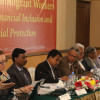Developing a supportive and inclusive workplace culture in Bangladesh
A few years ago, I found myself in an ILO workshop on the business case for the employment of people with disabilities. I was reminded of my O' Level Mathematics teacher at Chittagong Grammar School, who had lost his previous job due to the sudden onset of his physical disability. His students started producing stellar results and he soon became a much sought-after teacher. Yet he always remained loyal to the school, as it offered him an opportunity when no one else would. Similar to that Maths class, the ILO workshop was revelatory, inspiring and full of possibilities, as it lead us at our company to consider daily life and employment from the perspective of a person with disabilities.
The UN estimates that 15 percent of the world's population is living with disabilities, making people with disabilities the largest minority group globally. The world is shifting from a welfare-based approach to a rights-based approach when it comes to disability issues. It is imperative to shift attitudes and accommodate the needs of people with disabilities through a holistic approach, paying special attention to the issue of skills development and employment.
The adoption of the ILO Business Charter on Disability by 11 multinational companies in Switzerland in 2015 marked a historic step in strengthening the commitment of employers to the cause of disability inclusion on a global level. The signatories of the charter are multinationals such as Accenture, Carrefour, L'Oréal and Michelin, amongst others. These organisations are members of the ILO Global Business and Disability Network, which facilitated the creation and adoption of the charter. "By honouring the commitments of this charter, the private sector will be showing in the most concrete way how real leadership is making it possible for people with disabilities to have productive work and to live in dignity", said the ILO Director-General, Guy Ryder. Countries as diverse as Australia, Brazil, Saudi Arabia, South Africa and Sri Lanka, amongst others, have established national business and disability networks. Bangladeshi employers are also stepping up to the challenge and forming their own network.
A recent workshop in Dhaka brought together employers of various industries interested in making their workplaces more inclusive in an effort to promote diversity. Champions of this cause along with committed employers proposed the establishment of Bangladesh Business and Disability Network (BBDN), which will represent the collective voice of private sector employers on disability related issues, on a national level. The establishment of BBDN is being lead by the Bangladesh Employers Federation with assistance from the ILO. The Network members will strategically work towards greater disability inclusion in the workforce. The ILO, with support from the Canadian government, has been promoting the position that employment of people with disabilities makes good business sense. People with disabilities tend to increase productivity, boost company morale, reduce absenteeism, improve company image and customer preference, increase job retention rates and improve safety standards amongst other value additions.
At BBDN, successful models of disability inclusion in the workforce will be shared and analysed, while existing challenges are identified and possible solutions implemented. BBDN will also connect employers with relevant NGOs and Disabled People's Organisations (DPOs) as necessary. DPOs and NGOs can serve not only as strategy consultants to develop best policies and practices, but also as project implementation partners. There have been successful collaborations, such as the RMG sewing machine operators' training that the Cenre for the Rehabilitation of the Paralysed (CRP) Dhaka provides to trainees with disabilities, who are then hired by Viyellatex Group and other RMG employers. Promising models may be considered for countrywide scale-up through public-private partnerships.
The government's legislative framework plays an integral role in protecting the rights of people with disabilities while directing the actions of employers and other stakeholders. The National Skills Development Policy 2012 sets a target of 5 percent enrolment of people with disabilities in all skills development programmes. These types of policies need to be enforced while broadly drafted ones, such as the Rights and Protection of Persons with Disabilities Act 2013, which alludes to the creation of employment for people with disabilities on a priority basis, as well as a possible tax exemption for employers, needs to be expanded upon for implementation. The BBDN will be well positioned to lobby for the enforcement of the relevant laws and policies.
As a member of the disability network, I invite all who are passionate about making Bangladesh an incredibly inclusive and friendly place for people of all kinds and from different walks of life, to join us, for only together can we bring about big change.
The writer is a Project Director, A.K.Khan & Company Ltd., A.K.Khan Foundation. He can be reached at [email protected]

 For all latest news, follow The Daily Star's Google News channel.
For all latest news, follow The Daily Star's Google News channel. 








Comments